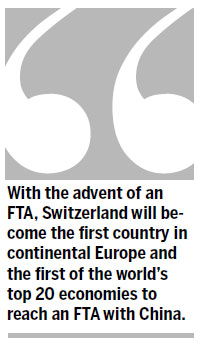Why Switzerland?
Editor's note: The following is an English translation of a signed article by Premier Li Keqiang published on May 23 in Neue Zürcher Zeitung of Switzerland.
Switzerland is the first European destination on the list of countries I will visit after becoming China's premier. In Chinese culture, being "first" always carries symbolic meaning. My choice of Switzerland is in no way haphazard: we have got a few important things to do here. They are all landmark events in China's opening-up, and they all have something to do with Switzerland.
The first job is to secure progress in the building of China-Switzerland FTA. It was during my last visit in 2010 that the two countries agreed to speed up preparations for an FTA. Over the past three years and more, the relevant departments and agencies of the two countries have worked energetically in the negotiations, and reached the final conclusion after nine rounds of talks. With the advent of an FTA, Switzerland will become the first country in continental Europe and the first of the world's top 20 economies to reach an FTA with China, the implications of which will be significant.

Last year, two-way trade reached $26.3 billion, including $22.8 billion of Swiss exports to China. That is to say, every Swiss man, woman and child exported $2,800 to China. To conclude this high-quality FTA agreement with Switzerland, China has made tremendous effort. It fully demonstrates that China will not stall in its opening-up and that it is firmly committed to upholding the multilateral trading regime, vigorously promoting regional trade liberalization, and accelerating the implementation of the FTA strategy. Moreover, a high-quality FTA agreement between China and Switzerland will also set a good example. It will not only upgrade our business and investment cooperation but also send a powerful message to the rest of the world that we reject trade and investment protectionism and instead embrace trade liberalization and facilitation. It will inject fresh impetus into China-EU business ties, bring tangible benefits to consumers and businesses in both our countries, and contribute to world trade and economic recovery.
The second job is to step up financial exchanges and cooperation between the two sides. Switzerland boasts the highest density of banks. It has a strong financial industry and rich regulatory experience. Enhancing cooperation with Switzerland in financial regulation, macroeconomic policy making, capital market development and other areas is consistent with China's need for further development of its open economy. China is introducing more reform and opening-up to its financial sector, including steadily advancing market-oriented reform of the interest rate, making RMB convertible under the capital account, putting in place a system of overseas investment by individual investors, and improving financial regulatory regime. All this will provide new opportunities for interactions and growth of our financial firms. At the same time, China and Switzerland can work together at the International Monetary Fund, World Bank and other international institutions, so as to make greater contribution to maintaining international financial stability and promoting world economic growth.
























